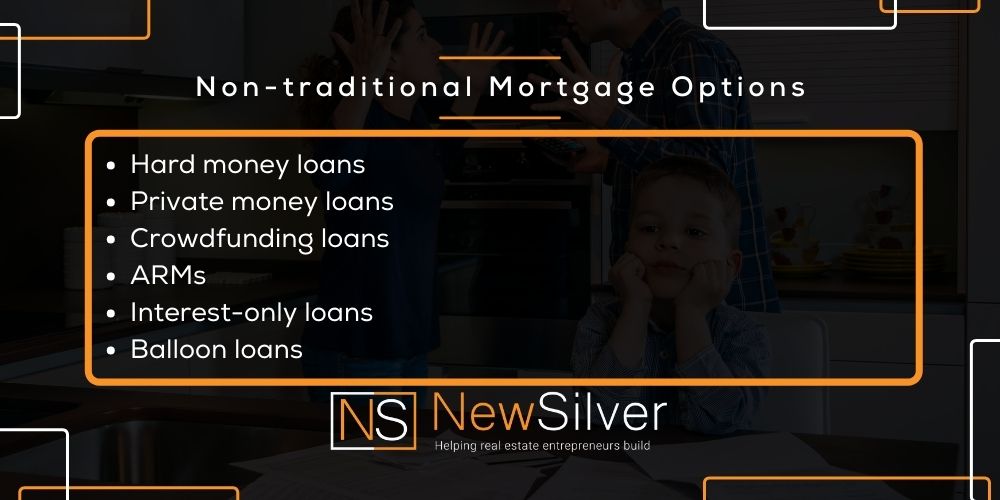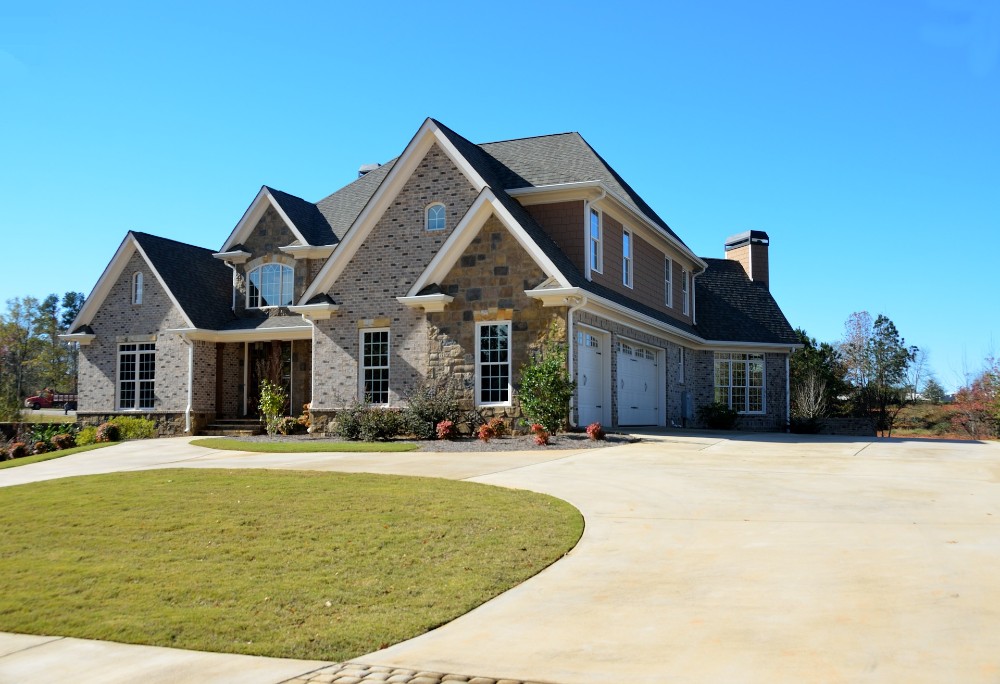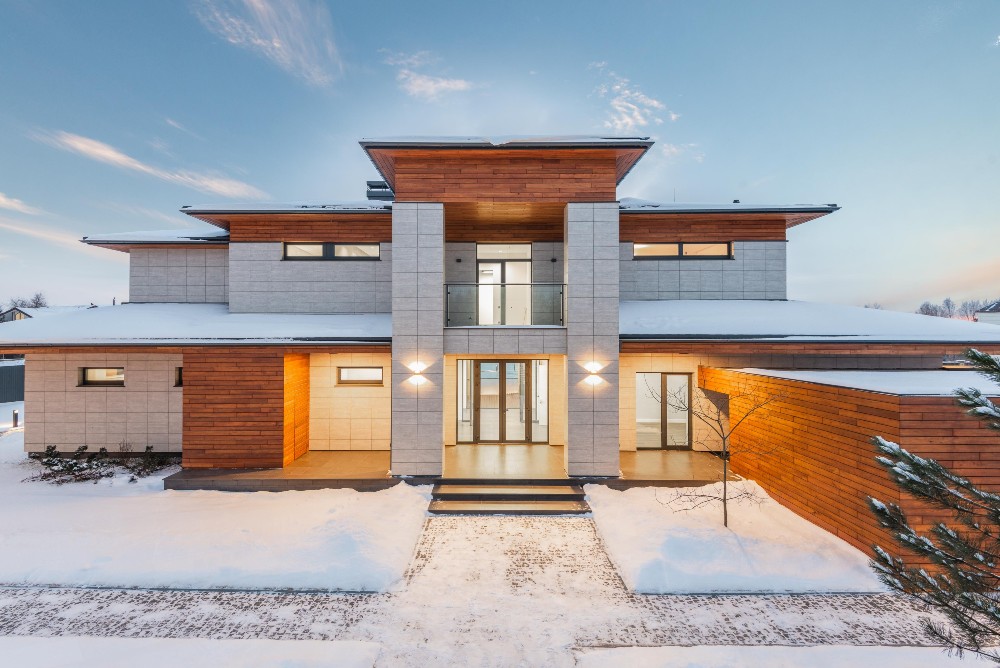A brief outline
If you’re looking for an alternative to traditional mortgage loans you might be wondering what your options are. The good news is, there are a variety of non-traditional mortgage loans that you can use. What are non-traditional mortgage loans? Keep reading to find out.
Table of Contents
Investors and home buyers who cannot qualify for a conventional mortgage, or simply aren’t interested in one, have a host of other options. These options can be grouped together under the umbrella term of “non-traditional mortgage loans”. From hard money loans to crowdfunding, these days people who are buying property have a wide selection of options that don’t involve using a traditional mortgage. If you’re one of these people, we’ll help you understand your options by looking at each non-traditional mortgage in more detail.
What are non-traditional mortgage loans?
The definition of a non-traditional mortgage loan is a loan that doesn’t follow the traditional requirements of a mortgage. These are mortgages that don’t have standard and fixed instalment payments or follow a traditional amortization schedule such as 15 or 30 years. Non-traditional mortgages offer borrowers more flexibility, instead of putting them into a structured loan with a specified loan term length and monthly instalment amount that hinges on the fixed or variable interest rate.
Non-traditional mortgage loans typically share these characteristics:
- An amortization schedule which doesn’t follow conventional timelines.
- An easier approval process than traditional mortgages.
- Flexible repayment terms.
- Higher interest rates.
- A larger risk as a result of the unconventional payment term options.
Non-traditional mortgage options
There are a variety of non-traditional mortgage loans, so we’ve outlined some of the main options to help you decide which is right for you.

Hard Money loans
Hard money loans or short-term bridge loans are offered by private companies or individuals. They have flexible repayment terms and loan lengths, which use the property to secure the loan. So, the value of the property and the deal itself are key to determining whether the loan will be granted or not.
Hard money loans are exceptionally fast to be approved and ideal for someone wanting to buy a house at short notice. Their lending criteria are typically less stringent than a mortgage, however the catch is that the interest rates are often higher than a traditional mortgage. Borrowers don’t need to have an outstanding credit history to apply for a hard money loan, and often the repayment terms can be negotiated.
Private Money Loans
Similar to hard money loans, private money loans are offered by private individuals or companies that are not affiliated with a traditional lending institution such as a bank. These are also short-term loans which can be used to purchase or refinance a property. These loans are quick to be approved and the loan amount is typically determined by the property’s value.
A promissory note is used as a contract, and the lender will use this to outline the terms of the loan, including the interest rate, length of the loan and any other necessary details. The property is used as collateral for the loan in case the borrower is unable to make their repayments every month. There are less regulations around these loans, so borrowers are able to enjoy flexibility, however interest rates may be higher.
Crowdfunding Loans
A form of creative financing that is growing in popularity is crowdfunding. How does it work? Individual investors on crowdfunding websites can help raise the funds that an investor or developer needs for their real estate project. The person who needs the funds will then submit their information on the crowdfunding platform, and investors can begin adding funds to the project if they see it as a viable opportunity.
Investors usually pool their money online, using a financial technology solution or on the crowdfunding site itself, to fund a real estate investment. The minimum investment often begins with as little as a few hundred dollars. The funds are usually held in a REIT (Real Estate Investment Trust) or something similar, which acts as a holding company where the funds can accumulate.
Adjustable-Rate Mortgages
Payment-option Adjustable-Rate Mortgages (ARMs) are another flexible loan type for borrowers. ARMs offer borrowers something unique in that they allow borrowers to choose their repayment amounts. For the first few months or years, ARMs will have a fixed interest rate, and after that it will change to a variable interest rate. The options are usually a low interest rate period for the first few months or years, a minimum monthly payment that the lender can choose, or a fully amortized schedule of repayments over 15 or 30 years.
The payment period where lower interest rates are used however, does cost the borrower in the long run as the difference in payment is added to the total, and effectively still being paid for. The interest rate on these loans can fluctuate as a result of the market, so borrowers will need to prepare for that.
Interest-only loans
When it comes to interest-only loans, as the name suggests, a borrower only needs to cover the interest payments every month, for a certain period of time. This can be anything from a year or 2, up to 10 years. After this, the lender may require the balance of the loan to be paid in a lump sum, or the lender may require the borrower to follow an amortized schedule for the remainder of the loan period. Real estate developers typically make use of these loans, and will refinance a property once it is built, to pay off the balance of the loan.
Balloon loans
Balloon mortgage loans offer the borrower the option to pay only interest or the principal plus interest, until a certain date where a lump sum is required to pay off what’s left of the loan. These loans are often used by developers as well, because they offer the option of deferred payments, albeit with higher interest rates. Usually, the monthly repayments are not enough to pay off the loan in its entirety, so when it matures, there is a lump sum that will need to be paid.
Advantages of non-traditional mortgages

- Approval is quicker and easier: Non-traditional mortgages are easier to qualify for, which means that you can get approval for these quicker. People who are struggling to qualify for traditional mortgage loans can often turn to non-traditional options.
- More flexibility: These loans offer borrowers more flexibility on loan terms, length, monthly repayments and more. Which means that borrowers can structure the loan to suit their financial situation.
- Ideal for short-term: For fix and flips and other short-term projects, non-traditional loans are a great solution because they often have shorter loan terms.
- Smaller down payment: These loans usually don’t require a large down payment like traditional mortgages, in fact some non-traditional loans don’t even require a down payment at all.
- Higher loan limits: Non-traditional loans can offer higher limits than traditional mortgages which is great for those who are looking to purchase a property of a higher value.
- Pay off loan quicker: Due to the fact that non-traditional loans offer shorter loan periods, this means that borrowers can pay off their loan quicker and aren’t locked into a 15 or 30 year amortization schedule.
Disadvantages of non-traditional loans
- Higher interest rates: The downside of non-traditional loans is that they often come with higher interest rates than traditional mortgages, as a result of the easier lending criteria and to make up for the risk that the lenders are taking.
- Default risk is higher: Flexible payment options may seem like a good idea, but they can also be a problem for borrowers if they haven’t budgeted correctly, or their cash flow cannot sustain a higher amount. In which case they would default on payments.
- Harder to build equity: Building equity on your home can take longer and be more difficult with non-traditional loans because often borrowers are only paying the interest on their loans and very little of the principal amount. Also, if the value of the property declines, this could have a major impact on the mortgage and the borrower.
Is a non-traditional mortgage right for you?

The decision between a traditional mortgage and a non-traditional mortgage hinges on your personal financial situation. For example, if you have a low credit score and are struggling to qualify for a traditional mortgage, then a non-traditional loan could be the solution for you, or if you’re a developer and you need funds quickly to invest in a good deal and can make a lump sum payment a few years down the line, then non-traditional loan options are also a good path.
You should consider the pros and cons of non-traditional loans, weigh this up against your personal financial situation, and the property that you’d like to purchase and make the decision from a place of knowledge.
Closing thoughts
Non-traditional loans can be a saving grace for those who are wanting to get onto the property ladder but either don’t qualify for, or don’t want to use traditional loans. It’s important to do the research on the type of loan you’re choosing however, before you go ahead and apply, so that you can make sure the loan is the best fit for you.



